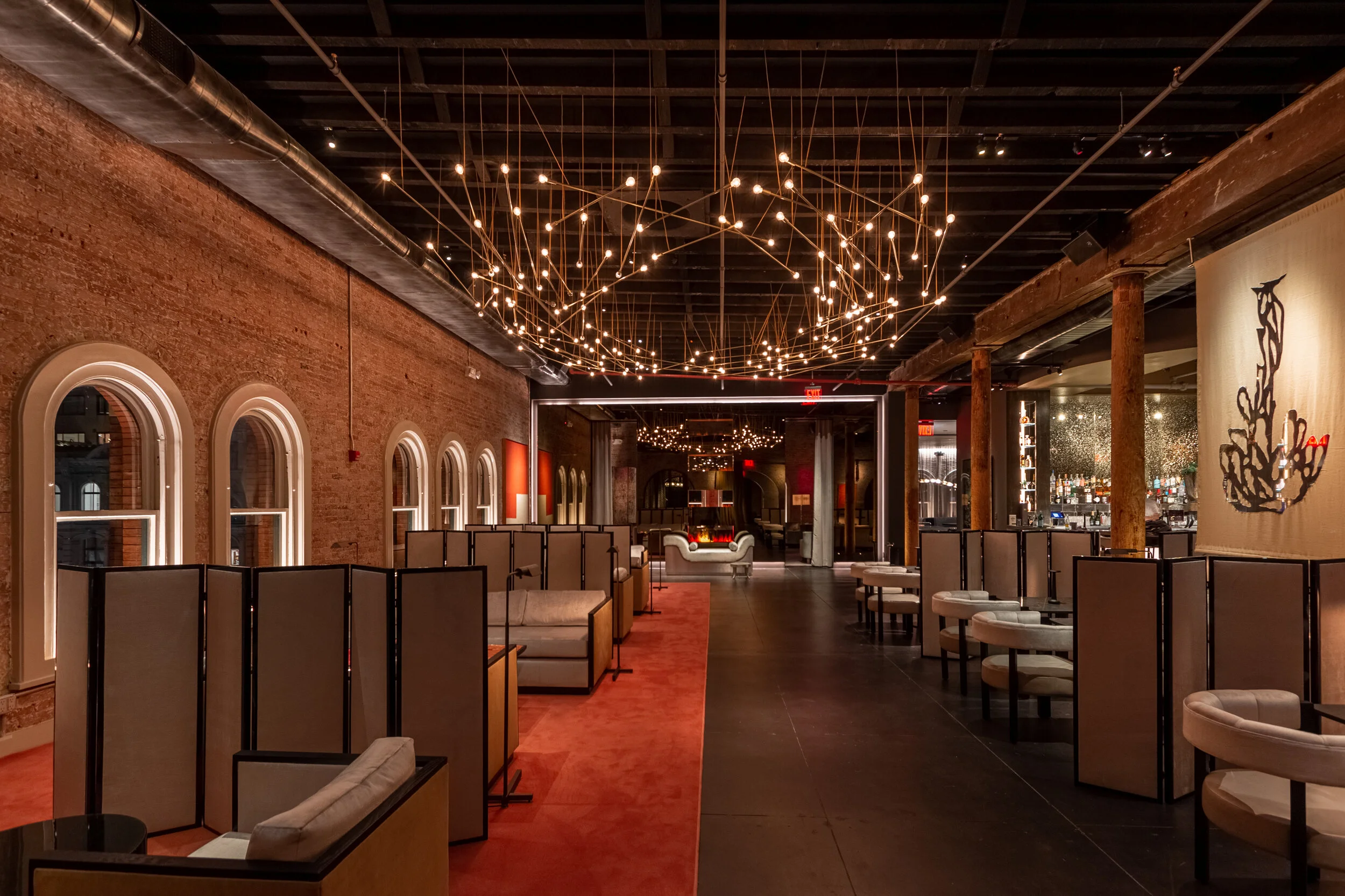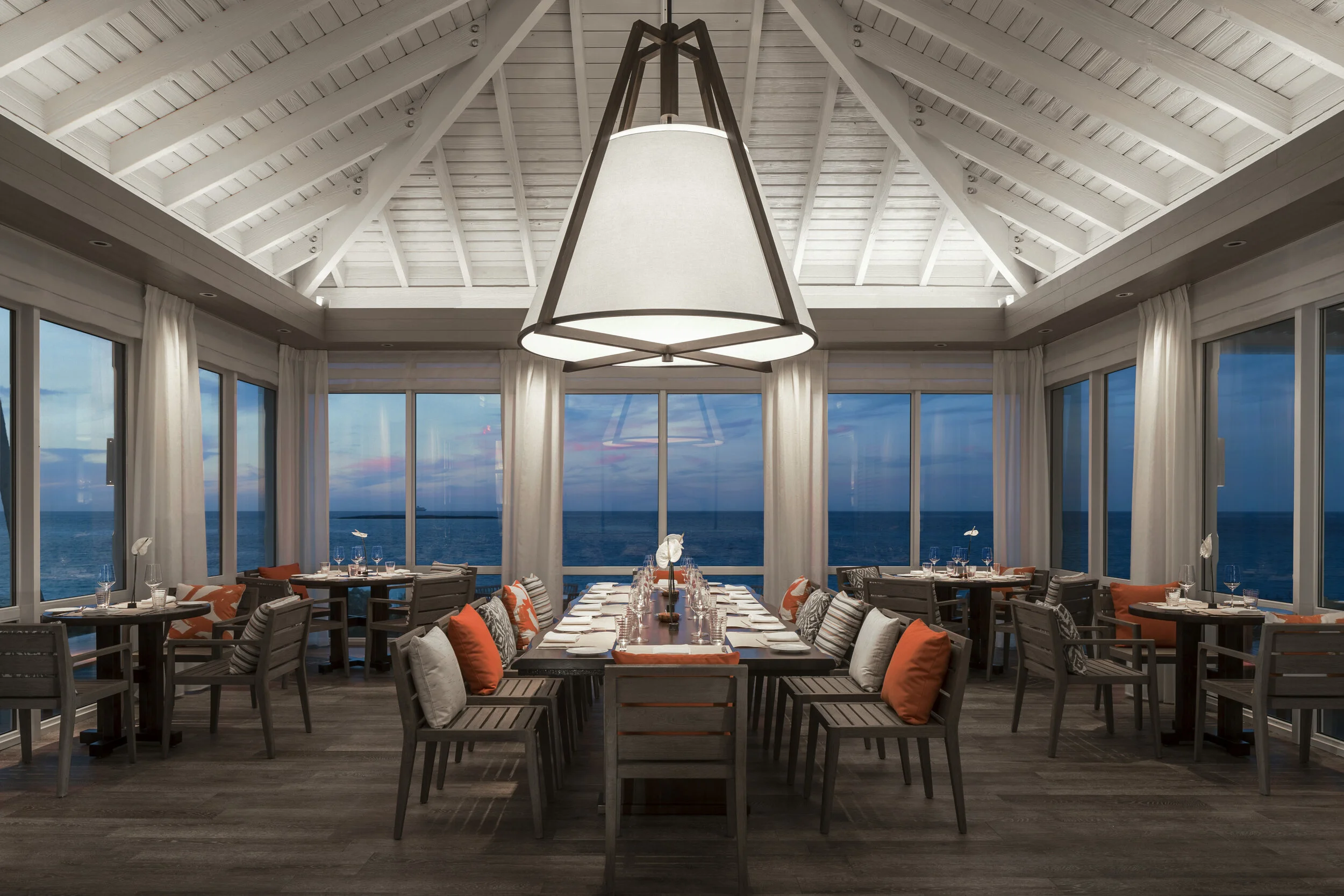October 2020
The Chandelier at Zero Bond
New York, NY
Zero Bond is a new members-only social club located in New York City’s Lower Manhattan. In collaboration with owner Scott Sartiano and Studio Sofield, our team created a lighting design for the landmarked space that highlights its fine art and architecture, while also offering a sense of warmth and luxury with custom decorative lighting solutions. Most notable is the main dining room’s chandelier, constructed onsite by the Focus Lighting team. The chandelier is comprised of 160 clear incandescent bulbs mounted to rods ranging between three and five feet. Each fixture has a track fitter at the end of both cables, mounted to a grid of lighting track which provided us a flexible infrastructure to sculpt the chandelier in the field.
Check out the video below to see the team in action.
"The room, the music, somebody pouring wine for you, the lighting - that doesn't fit in a to-go box." - Nina Compton, New Orleans chef
These words caught my eye one morning. I had to stop and read slowly, their weight capturing my attention. Realizing in a long moment what we’re all missing out on now that hospitality looks so different: not only the togetherness, but the void of an ambiance we no longer feel. As a lighting designer from theater, I’m fascinated by stories and creating the ambiance for a perfect setting. Endlessly analyzing and then re-imagining the perfect backdrop for every life situation, asking myself if the ambiance can be changed, and if so - can it change me?
How do we re-imagine hospitality?
Going out for a meal or to a new hospitality destination is an exciting opportunity to experience someone else’s story and the resulting emotions that well up within. The mystery of those sensory stimulations is what I think Compton alludes to in her quote. Our once effortlessly enjoyed stories now face extreme challenges. Can we overcome them? I believe so, but more importantly, can we re-imagine what our hospitality stories look like? What scenes need to be re-written, morphing to fill our current needs? What beloved scenes remain? Do we discover in the adaptation new moments we love and long to keep?
What do we need to change?
Remember those intricate forts you built indoors as a child with your siblings or friends? What emotion did that “home” within a home make you feel? For me, fond memories of playfulness, laughter, and coziness come to mind; the idea that I was safe and comforted. Could these structures within a structure provide similar feelings for hospitality spaces in a time when we need them? Do we create modular “tents” that can be repositioned inside or outside depending on capacity allowances? Are some structures visually open yet physically separate so we can feel “together” apart? Or do we embrace the intimacy with structures that visually obstruct, letting only one or two sensory stimulants through its embrace? Can we create the sense of camping in nature around a warm fire, or the illusion of being surrounding by the soft light of sunset?
What do we want to keep?
What do we have now that we want to keep in our storylines? Maybe it’s the warmth you feel upon entering a space, the immediate sense you’re safe, or maybe someone simply listens to your needs for the span of one meal. How do we celebrate and highlight the cozy nooks found in your local cafe, the intimate candle lit dinners with your partner, or the rich sensory stimulation of experiencing a new restaurant with close friends? These stories are all rich with meaning and though they may look different now, the feelings these experiences trigger can still be achieved.
What lingers?
As we re-write these stories - what new scenes and settings emerge that we love? Can we adopt them and improve our story moving forward? For me personally, I know the outdoor dining experience is one I want to linger. Breathing in the city air, surrounded by the myriad sounds of life, light from businesses and restaurants glowing near and far: a boon to my spirits. Can we as designers help expand these ideas, devising creative solutions that adapt and regenerate for each season as we grow and change?
A new story…
How do we help our audience not merely “accept” the way things are, but learn to embrace these new scenes for their own unique beauty and meaning until we can once again celebrate life together in ALL the ways we know and love. What emotion does your venue evoke in you and your guests? Do you want to re-write that story either temporarily or permanently? We’re here to help and can work with you to develop and stage your new visual storyline through light.
It doesn't fit in a to-go box
By: Jenny Nicholas, Senior Designer
"The room, the music, somebody pouring wine for you, the lighting - that doesn't fit in a to-go box." - Nina Compton, New Orleans chef
These words caught my eye one morning. I had to stop and read slowly, their weight capturing my attention. Realizing in a long moment what we’re all missing out on now that hospitality looks so different: not only the togetherness, but the void of an ambiance we no longer feel. As a lighting designer from theater, I’m fascinated by stories and creating the ambiance for a perfect setting. Endlessly analyzing and then re-imagining the perfect backdrop for every life situation, asking myself if the ambiance can be changed, and if so - can it change me?










